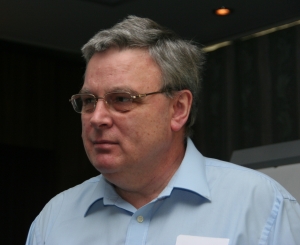Date of Birth: 4 January, 1945 Nationality: UK
ORCID ID: orcid.org/0000-0001-6709-7343
Researcher ID : F-7813-2011
Academic Qualifications:
1966 B.Sc., 1st. class Hons Theoretical Physics, Manchester Univ.
1967 Diploma for Advanced Studies in Science (with Distinction), Manchester University. (Calculation of dispersion forces and optical properties of helical polynucleotides.)
1969 Ph.D., Biophysics, Manchester University. (Thermodynamics of assembly and stability of collagen.)
Appointments:
1970-73 SRC Research Fellow, Laboratory of Molecular Biophysics, Oxford University (with Prof.Sir David Phillips), and Junior Research Fellow, Wolfson College, Oxford.
1973-76 NIH Research Fellow and Pathology of Membranes Training Program, Dept. of Chemistry, Yale University, USA (with Prof. J.M. Sturtevant).
1976-88 Lecturer in Physical Chemistry, Dept. of Chemistry, Glasgow University.
1988-90 Senior Lecturer, Dept. of Chemistry, Glasgow University.
1990-98 Reader, Biophysical Chemistry, Glasgow University.
1998-2010 Professor of Biophysical Chemistry, Head of Biomolecular Chemistry, Glasgow University.
2010- Emeritus Professor of Biophysical Chemistry, Honorary Senior Research Fellow, Glasgow University.
Professional Honours/Affiliations:
Fellow of the Royal Society of Chemistry and Chartered Chemist (C.Chem., FRSC)
Fellow of the Institute of Physics and Chartered Physicist (C.Phys., F.Inst.P.)
Honorary Member, British Biophysical Society 2014
External Activities:
Principal Editor: Biophysical Chemistry (2000-2010)
Editorial board: European Biophysics Journal, Journal of the Iranian Chemical Society
Editorial board: BMC Biochemistry (since Sept. 2004)
Molecular Biosciences Foresight Working Party member (RSC & UKLSC)
Member, ESF Working Party on post-genome biophysical studies
Management committee, COST D22 protein-lipid interaction.
External assessor, Danish NSRC
External examiner for Chemistry modules, University of Stirling
External assessor, Swiss National Science Foundation (April 2007)
External assessor, University of Oslo (April 2008)
Member, international review panel – Healthcare Technologies – CNCP Tbilisi (Georgia), Oct 2010
Review Committee for the subject area “Biophysical Sciences including Chemistry”, Saha Institute of Nuclear Physics, Kolkata (India), November 2010
Departmental/University Duties: (Prior to retirement)
Head/Line Manager Biomolecular Chemistry Section in the Chemistry Dept. (responsible for research policy, postgraduate student progress and monitoring, staff development, etc.)
Member of Departmental Executive and Management Group
Departmental Teaching Committee
Convenor, University Health, Safety & Environment Committee (Court Committee responsible for health and safety issues across the university)
Science Faculty Appeals Committee
University Senate
School of Infection & Immunity Management Committee (depute)
Physical Science Faculty ethics officer
Member of University Ethics Committee and FBLS Ethics Committee
Convenor: GU Safety Directorate.
Informal profile
Alan Cooper is Emeritus Professor of Biophysical Chemistry and formerly Head of Biomolecular Chemistry at Glasgow University. He is a native of the North of England, where he originally studied theoretical physics (BSc) and biophysics (PhD) at Manchester University. This was followed by postdoctoral research in Oxford (with Professor David C. Phillips) and Yale (with Professor Julian M. Sturtevant), prior to taking up a permanent appointment in Chemistry at Glasgow University in 1976. He has a lifelong interest in the fundamental and experimental aspects of the thermodynamics of non-covalent interactions in proteins and other biomolecules, and since 1989 has directed the BBSRC/EPSRC UK national facility for biomolecular calorimetry. In recent years his interests have broadened to include the exploration of new proteins and unusual biomaterials from exotic sources, in collaboration with zoologist colleagues (and a great excuse to experience field work in the rain forest). He was until recently Principal Editor of Biophysical Chemistry and is a Fellow of both the Royal Society of Chemistry (FRSC) and the Institute of Physics (FInstP). He is also a Chartered Chemist (CChem) and a Chartered Physicist (CPhys) – but would probably earn much more as a chartered accountant. In his spare time he plays oboe and cor anglais (to amateur standards), and is founder member of the wind group, Black Vanilla Orchid.
Alan is considered to be an expert in the application of biophysical techniques to the study of biomolecular interactions in solution, particularly in the use of microcalorimetry to determine the thermodynamics of macromolecular stabilities and interactions. His particular interest and expertise is in the biophysical chemistry of protein folding, misfolding and aggregation; protein-ligand, protein-protein, protein-DNA, and DNA-drug binding; together with biomaterials chemistry, protein foams, nematode polyproteins and peptide-antibiotic interactions. His experiences with microcalorimetry began in the early 1970’s as a postdoc in David Phillips’ Molecular Biophysics Laboratory in Oxford – a magical time, when only 3 or 4 protein structures were known, and it was naively imagined that understanding the thermodynamics of protein folding and interactions would be a doddle. This was followed by another postdoctoral position, this time at Yale with Julian Sturtevant – one of the pioneers of biological microcalorimetry. Things were much more relaxed in those days, and Julian was happy to let his postdocs do their own things, including drilling holes in his calorimeters to fit fibre optics and convert them into photocalorimeters to study the energetics of rhodopsin. This work continued on moving to Glasgow, including development of very low temperature photocalorimetry that led to determination of the energetics of the very earliest stages in the photochemistry of the visual process. It was at this time that he did key work on the thermodynamics of protein fluctuations, contributing to the growing awareness – quite controversial at the time, but now accepted as obvious – that protein molecules are flexible, dynamic entities, and that a static description of their structures alone is not adequate to explain their properties. Other interests have taken hold in recent years, and microcalorimetry is now more of a background activity, though he still dabbles in attempts to understand the basics of non-covalent interactions, including new ways of looking at such things.
